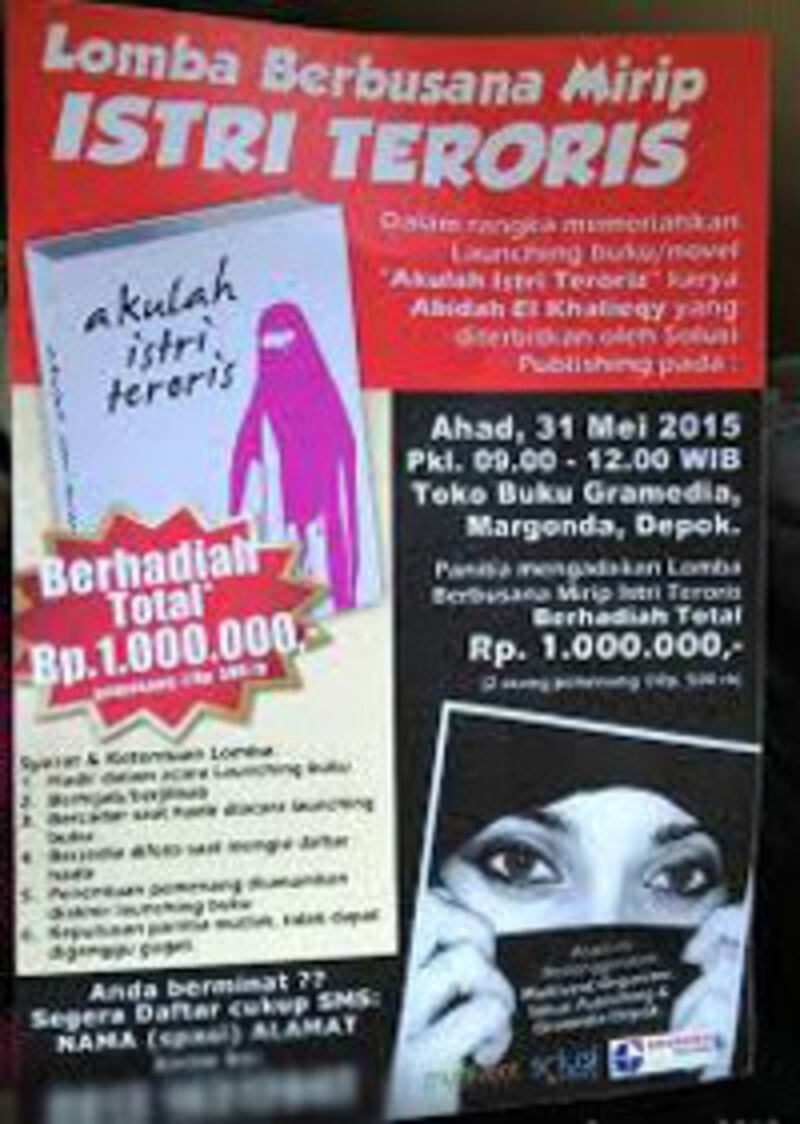A popular Indonesian writer has drawn some negative attention for her 14th novel, titled "I am the Wife of a Terrorist."
The book is intended to humanize the wives and children of terrorists and terrorism suspects, according to its author, Abidah El Khalieqy.
But police in West Java province on Sunday cancelled the latest event related to the launch of her book that included a contest to "dress like a terrorist's wife."
The event was to take place in Depok, but authorities there would investigate to see "if there are other purposes to this event," local police chief Dwiyono sai.d
The Indonesian Ulema Council (MUI) had urged the Gramedia book shop in Depok to cancel Sunday's event, according to a representative of the clerical body, Anton Tabah.
"I have not read the book, but the fashion show 'a terrorist's wife' as part of a book launch is disturbing for people in Depok," Anton told BenarNews.
Cash prize for best burqa

Publisher Ahmad Bahar came up with the idea for a fashion contest, which promised a 1 million-rupiah ($75-) prize for the winner. It was advertised via social media and with flyers (pictured).
"We staged this contest to attract attention. I've done similar contests, such as 'Smile Like Jokowi' to launch my book about Jokowi," Ahmad told a press conference in Depok on Sunday; referring to the nickname for Indonesian President Joko Widodo.
The book was widely misunderstood by those who had not yet read it, he suggested.
"The book itself intends to support the police in promoting de-radicalization programs," Ahmad said.
In April, a book-launch event minus the fashion contest drew a crowd of some 450 protesters from local Islamic schools in Tasikmalaya, a conservative West Java town.
"We got an ultimatum to disperse in two hours' time," Ahmad said.
Stigmatized
In writing the book, Abidah conducted research among the wives of terrorism suspects in Sulawesi.
"I wrote my book because I felt that, in Indonesian literature, no book has talked about the wife of a terrorist. As a writer, I was curious to find out who they are," Abidah said.
"I did some research about them through the media, books, and of course, field research. And it was not easy. I had to be accompanied by police. Then I went to Poso," she said.
The women have different degrees of knowledge about their husbands' activity, she found.
"There are those who have no idea that their husbands are terrorists; those who know that their husbands are terrorists; and those who find out when their husbands die," she said.
Indonesia's anti-terrorism police wing, Densus 88, is controversial for its use of force that has seen many terror suspects shot dead before they have the chance to defend themselves in court.
Abidah said the purpose of her novel was to humanize such women and their children in the eyes of the public.
"They need respect and attention to move on with their lives," she said. "I hope this novel awakens all of us to help defend them."
A picture of a veiled women illustrates the cover of her 481-page novel.
It tells the story of a burqa-wearing woman, Ayu, who is shunned by her community because her husband, Ardiyanto, is a suspected terrorist.
Abidah plans to turn the story into a movie – following the previous success of her previous book, "Woman in a Turban," on the big screen.
The book has an important message, according to counterterrorism expert Abu Harith Ulya.
"This is a good step to open discourse in society that Islam is not synonymous with terrorists," he told BenarNews.
Maeswara Palupi contributed to this article.
